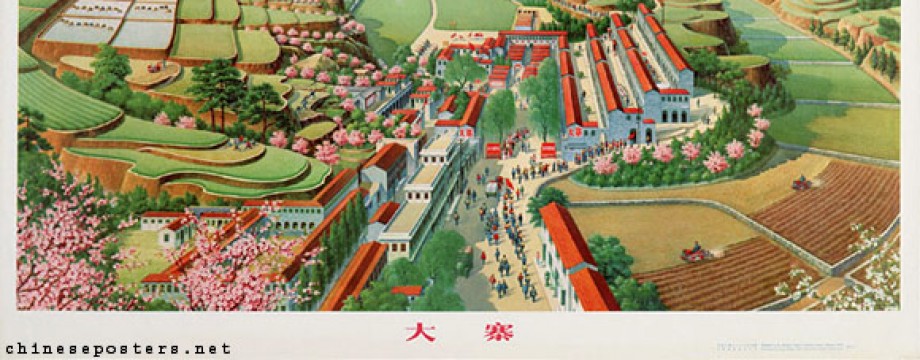Production and Distribution of Medical Knowledge in Rural China: Maoist and post-Maoist Experiences
Workshop
Erlangen, 11-12 February 2014
In 20th century, China has transformed itself from a pre-modern agrarian state to one that is dominated by the worship of science and technology and to one that relentlessly pursues the establishment of a scientific society. This transformation was not limited to the urban areas, but can also be observed in the rural areas where the modernization of agricultural production, the improvement of health conditions and the establishment of educational institutions relied heavily on science and technology when justifying the transformation.
Since the foundation of the People’s Republic of China, both the field of Traditional Chinese Medicine and Traditional Chinese Veterinary Medicine have experienced successful efforts of scientification, resulting in a thorough remodeling of medical knowledge and practices. Existing research in the field of TCM and TCVM has already analyzed the political and social impact of this remodeling, yet without sufficiently taking into consideration the question how medical knowledge is produced, disseminated and accepted in times when medical science was largely conceived as a Western tradition. In the case of the PRC, the re-emergence of TCM has long been considered to be an ideological project that was thought to provide medical care in times of economic restraints, yet its impact on Chinese society and the implications of its revival for the field of medical knowledge remains understudied.
11th February
9:00h-9:30h Welcome Address
9:30h-10:15h Keynote Lecture Tong Lam
10:30h-12:30h 2 Presentations (Matten and Chang)
12:30h-13:30h Lunch Break
14:00h-16:30h 2 Presentations (Springer and Kunze)
16:30h-17:30h Final Discussion
12th February
9:00h-12:00h Visit to the SASS-Collection
List of Abstracts:
Empiricism and the Nation
Tong Lam
The presentation addresses how and why empirical knowledge and the modern fact became the basis for the construction, imagination, and management of the Chinese nation-state. Drawing on arguments from my book A Passion for Facts as well as my ongoing research on contemporary China, this presentation seeks to discuss how empirical facts are used by the state and corporations for governance and by the ordinary people to curate their everyday life, both in the turn of the last century and today.
Promoting Scientific Thinking in Communist China – the conceptualization of medicine in Maoist China
Marc Andre Matten
This paper discusses the strategies and methods of propagating science and scientific thinking in post-1949 China. By focusing on the modernization and introduction of new medical knowledge I argue that the dissemination of new knowledge (kexue puji) was a highly complex process that owed its success to a great deal of creativity in defining and legitimizing both modern and traditional, foreign and indigenous forms of scientific knowledge. By analyzing medical handbooks and manuals, journals and textbooks, as well as new media, I show that this resulted in the creation of two different systems of knowledge that both claimed to be scientific, but surprisingly did not contradict each other. Though omnipresent in Maoist China and sometimes serving a purpose in political campaigns, the application of science (kexue) was rather pragmatic.
US Aids and the Distribution of Veterinarian Knowledge in Post-war Taiwan
Che-chia Chang
This paper is to discuss the establishment of the modern veterinarian knowledge in Post-war Taiwan. Under the support of the US Aids, the Joint Commission of Rural Reconstruction (Nongfuhui農復會) was set up to play the major functions. In order to strengthen the “Base of Revival”, the Joint Commission greatly relied on the veterinarian knowledge as well as personnel from the United States to promote the new pasturage in Taiwan. This paper would especially focus on the strategy and ideas behind the media, including film and the major journal Fengnian豐 年 (Abundant Year), of broadcasting veterinarian knowledge, so as to unveil the situations and receptions of the post-war rural Taiwan.
Science for the “New Society:” the Dissemination of Scientific Knowledge in the 1950s and the 1960s
Wang Rui
The fifth part of the Common Program of the People’s Congress (Renmin zhengxie gongtong gangling 人民政协共同纲领, 1949) of the People’s Republic of China (PRC) not just set up the features of culture and education as being national, scientific, and of the masses, but further stipulated that “the love of science” should be promoted as a civic virtue and scientific knowledge should be disseminated. The notion of “science” includes natural science in service to industry, agriculture, and national defense and scientific historical view to study and explain history, economics, politics, culture and international affairs. This presentation intends to give a survey of the implementation of these ideas on “science” in the first two decades of the PRC, which carried both changes and continuities from that of Republican China and laid the foundation of the knowledge production of “science” in the PRC, especially Maoist China. By looking at the following primary sources: pictorials, school textbooks, popular science magazines, professional journals for cadres in the management position, a large part of the presentation will concern itself with the discursive strategies of science dissemination among two groups essential to forming the “new society” – the worker (new class) and the child (new man). These strategies are different yet related to those used for rural audience (e.g. 劳模技术革新表演 technological innovation demonstration of the working model vs. 试验田 experiment field). As examples, I plan to analyze the discursive strategies employed in the introduction of technological innovations, in particular the indigenous ways of smelting iron and making steel, in popular science magazines (e.g. Zhishi jiushi liliang 知识就是力量, kexue huabao 科学画报) and professional management journals (e.g. Yejinbao 冶金报) as well as science education textbooks for primary schools (ziran 自然 or changshi 常识) from the early 1950s to the mid-1960s.
